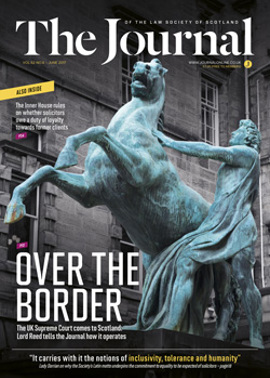What's the measure of a ruler?

The question, “What makes a great business leader?” is perennially interesting. A new attempt to answer it has just been published in the Harvard Business Review (May-June 2017, 71-74), using assessment data on “over 17,000 C-suite executives”. In case you’re wondering, C-suite is a slang term for a company’s most senior people, the acronyms of whose titles tend to start with “C”, as with chief executive officer, or chief operating officer. See?
The report says that effective leaders share four behaviours:
1. Deciding with speed and conviction
Successful leaders do not make great decisions all the time, but they make decisions earlier, faster and with greater conviction, even if there is ambiguity or incomplete information. In the data, executives described as “decisive” were 12 times more likely to be high-performing.
They are not smarter. Those with the highest IQ, who relish complexity, were often caught out taking too long mulling decisions. As the report says, leaders who are smart, but slow to decide, become bottlenecks. In most cases, bad decisions (which usually can be corrected) are better than no decision, a view that sits uneasily with lawyers, who are famously risk-averse. That said, leaders need to know when to avoid being bounced into a decision with indecent haste. They should ask, “Do I have to take this decision myself, or is it better taken further down the business?”
2. Engaging for impact
Successful leaders are adept at understanding the priorities of the different stakeholders in their businesses, and bringing them on board. When they know there will be resistance, they are thoughtful and considerate in diverting it and turning it into something positive.
Leaders often underestimate how closely their every gesture is scrutinised. Body language is hugely influential, and “emotional contagion” a constant risk. As one CEO put it, “If you grimace during someone’s presentation because of your bad back, the person making the presentation thinks they’ve been fired.”
Engagement does not mean being liked at all costs, avoiding conflict, or protecting people from tough decisions. The report uses a phrase that will resonate with every law firm leader: “Everyone should have a voice, but not a vote.” The best leaders are adroit at handling conflict, engaging with everyone in an open, upfront way and then being unafraid to make decisions in the best interest of the whole business.
3. Adapting proactively
Darwin did not say that evolution was the survival of the fittest, but survival of the most adaptable to change. So it is in business. The report highlights two features of successful adaptation:
Taking a long-term view. The most adaptable leaders spend more than 50% of their time on long-term thinking. They look upwards and outwards, immersing themselves in flows of information from diverse sources, and finding relevance in data that may superficially not be relevant to their business. As a result, the report says, they sense change earlier and move to take advantage of it. To succeed, you need a keen awareness of the economic and social forces shaping your business and your clients.
Accepting that setbacks are inevitable. Adaptable leaders embrace the fact that setbacks are an inevitable part of changing course. They are resilient, and quick to make changes when needed. They are open in explaining that they have not hit the mark and what they are going to do about it. The F-word is taboo. A setback is never a failure, but an experience from which to learn, improve and move on.
4. Being reliable
Mundane and obvious though it sounds, the report says this quality is by far the most important. You cannot underestimate the importance a business places on having a safe, dependable pair of hands at the top. What are the keys to reliability?
Realistic expectations. The report warns against the temptation to leap into execution mode, before looking in depth at budgets and plans, engaging closely with all parts of the business and with clients.
Strong organisation and planning. Leaders who rank high for reliability have strong management systems and processes in place which ensures their finger is firmly on the business’s pulse. They have easy access to financial and performance metrics which enable them to steer the right course, and change it if necessary.
A great team. Successful leaders move decisively to upgrade talent and set a high bar. They focus only on performance, not on being comfortable, or on personal loyalty.
Finally, you may have noticed that integrity and work ethic are not mentioned. But consider this sobering insight: while they are important for screening out unsuitable candidates, 100% of low-performing CEOs in the study scored high on integrity and 97% on work ethic. Essential they may be, but not sufficient.
In this issue
- Neutrality policies in commercial companies
- Court IT: the young lawyers' view
- Human rights: answering to the UN
- Galo and fair trial: which way for Scotland?
- Secondary victims in clinical negligence
- Reading for pleasure
- Opinion: Alan W Robertson
- Book reviews
- Profile
- President's column
- Twin tracks to completion
- People on the move
- Court of the nations
- Second time around
- How to avoid a summer tax scorcher
- Humani nihil alienum: a call to equality
- Sheriff commercial procedure: count 10
- Taking a pay cut: fair to refuse?
- Fine to park here?
- Enter the Bowen reforms
- Home grown
- Limited partnerships: a new breed
- Salvesen fallout: the latest round
- Gambling in football – the Scottish perspective
- Scottish Solicitors' Discipline Tribunal
- Changing sides
- Business drivers
- CCBE comes to Edinburgh
- "Find a solicitor" gets an upgrade
- Law reform roundup
- Thoughts on a frenetic year
- Check those bank instructions
- Fraud alert – ongoing bank frauds identified
- AML: sizing up the risk
- Master Policy Renewal: what you need to know
- Without prejudice
- What's the measure of a ruler?
- Ask Ash






